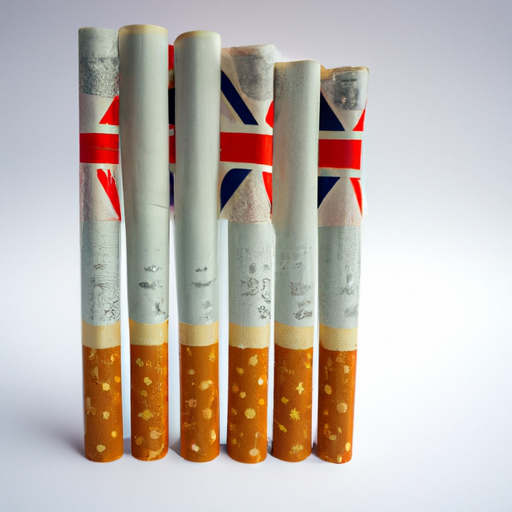
As a smoker in the UK, I’ve had my fair share of experience with cigarettes. From indulging in a quick smoke break with friends to facing the constant battle of trying to quit, cigarettes have been a constant presence in my life.
But as much as I enjoy smoking, there’s no denying the negative impact it has on our health and society. In this article, I want to delve into the world of cigarettes in the UK and explore its history, regulations, and current status in our society.
History of Cigarettes in the UK
Cigarettes have been a part of British culture since the early 16th century. Back then, tobacco was brought from the Americas and was predominantly used for medicinal purposes. However, the commercial production and consumption of cigarettes didn’t begin until the 19th century.
In the late 1800s, the first pre-rolled cigarettes were introduced, making them more accessible and popular among the masses. This also led to the rise of tobacco companies and the start of intense marketing campaigns to promote their products.
By the mid-20th century, smoking had become widespread in the UK, with companies like British American Tobacco and Imperial Tobacco dominating the market. However, the dangers of smoking were not yet widely known or accepted.
It wasn’t until the 1950s that the first research connecting smoking to lung cancer was published. This sparked public debate and awareness campaigns about the harmful effects of cigarettes. Laws banning advertising for tobacco products were introduced in the following decades, with the most significant one being the 2002 Tobacco Advertising and Promotion Act.
Current Regulations on Cigarettes in the UK
Today, the sale, marketing, and consumption of cigarettes in the UK are heavily regulated. It is illegal to sell cigarettes to anyone under the age of 18, and all packaging must include warning labels that cover at least 65% of the pack’s surface. These warnings include phrases like “Smoking kills,” “Smoking causes cancer,” and “Smoking harms unborn children.”
Moreover, all cigarettes must comply with the EU Tobacco Products Directive, which sets standards for the manufacturing, packaging, and labelling of tobacco products. This includes limiting the amount of tar, nicotine, and carbon monoxide in cigarettes.
In addition, in recent years, the UK government has taken steps to further reduce smoking rates by implementing measures such as banning smoking in enclosed public spaces and introducing plain packaging for tobacco products. This means that all cigarette packs now have a standard color and font, making it more difficult for companies to use attractive branding to entice consumers.
Impact of Cigarettes on Health and Society
Despite the strict regulations and awareness campaigns, the impact of cigarettes on health and society remains significant. According to the NHS, smoking is the leading cause of preventable illness and premature death in the UK, with more than 200,000 hospital admissions each year.
Cigarettes contain over 70 cancer-causing chemicals, with lung cancer being the most common and deadly form of cancer caused by smoking. But the health risks of smoking don’t stop there. It also increases the risk of heart disease, stroke, and a wide range of other health conditions.
Moreover, smoking also has a financial impact on society, costing the NHS billions of pounds each year. It’s estimated that treating smoking-related illnesses costs the NHS around £2 billion annually, with additional costs for social care and lost productivity.
Trying to Quit: Personal Experience
As a smoker, I’ve tried numerous times to quit, but unfortunately, without much success. Cigarettes have a strong addictive nature, making it difficult to kick the habit for good. However, I’ve noticed that the societal pressure and regulations have had a significant impact on the way I perceive smoking.
For instance, the plain packaging and warning labels have made me more mindful of my smoking habits. The constant reminder that “smoking kills” and the graphic images of damaged lungs have made me think twice before lighting up a cigarette.
Moreover, the ban on smoking in public places has forced me to be more considerate of others and the impact of my actions. It’s no longer socially acceptable to smoke anywhere, and as a result, I find myself smoking less frequently when I’m out and about.
However, despite these measures, I still struggle with quitting. The physical and psychological addiction to nicotine is challenging to overcome, and I often find myself giving in to cravings, especially in stressful situations.
Conclusion
In conclusion, cigarettes have a long and controversial history in the UK. From being a part of British culture to facing heavy regulations and societal pressure, cigarettes have undergone a significant transformation in our society.
However, the impact of smoking on health and society remains a prevalent issue, and it’s essential for both individuals and the government to continue efforts towards reducing smoking rates. As a smoker, I recognize the harmful effects of cigarettes and hope to one day successfully quit for the sake of my health and those around me.